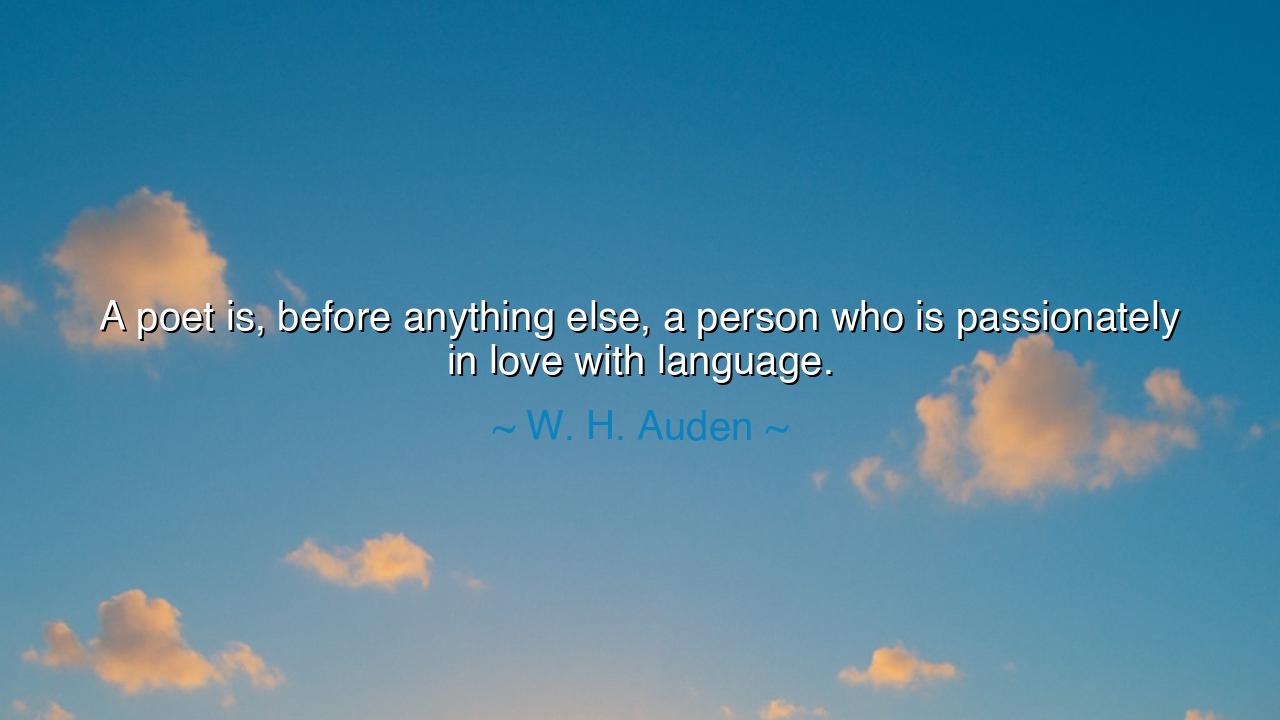
A poet is, before anything else, a person who is passionately in






“A poet is, before anything else, a person who is passionately in love with language.” Thus spoke W. H. Auden, the sage of modern verse, the craftsman whose words carved both sorrow and beauty into the soul of the twentieth century. In this radiant truth, Auden reminds us that poetry is not merely the art of ideas, nor the vessel of emotion, but the adoration of language itself—the sacred material through which thought and feeling are shaped. To be a poet, he tells us, is first and foremost to love the word—its texture, its rhythm, its mystery, its power to name the unnameable and to reveal the unseen. For words are not mere tools; they are living things, born of breath, shimmering with the music of creation.
To love language is to love the heartbeat of civilization. It is through language that humanity remembers, dreams, and connects. The poet, in Auden’s vision, is the one who kneels before this power with reverence and delight, exploring it as an alchemist explores gold. He does not wield words for vanity or praise but listens for their secret music. A true poet is one who feels the taste of words upon the tongue, who senses how a syllable can shimmer with emotion, how a single phrase can move the heart of nations. The poet’s love is not casual—it is passionate, obsessive, enduring. Just as lovers long to know every glance and gesture of the beloved, so the poet longs to know every sound and meaning of his language.
The origin of Auden’s wisdom lies in his lifelong devotion to the craft of writing. He was a man who viewed poetry as both prayer and discipline, a union of intellect and passion. Living through an age of war and disillusionment, he sought to restore truth and beauty through the careful arrangement of words. To him, the poet’s first loyalty was not to politics or philosophy, but to language itself. For only when one loves the word—when one honors its honesty and precision—can one hope to speak truth to the human condition. Auden knew that a poet who does not revere language will betray both art and audience; his voice will be hollow, his song lifeless. But one who loves language deeply will find in it the divine spark, capable of touching eternity.
Consider the example of William Shakespeare, that giant of English letters. His love for language was so complete that he expanded it, shaping the very tongue we speak today. Shakespeare did not merely use words—he married them, fusing rhythm and meaning until speech itself became music. When he wrote of love, jealousy, or death, his passion for words transformed human emotion into timeless art. In his hands, language was alive—capable of laughter, of tears, of thunder and whisper. It was this boundless affection for the word that made him immortal. As Auden would later remind the world, the poet’s first love affair is not with life or fame, but with language, and through it, life itself becomes luminous.
To love language as the poet does is to love the world. For language is the mirror of thought, the bridge between souls. When one learns to listen to its subtleties—to the rise and fall of its sounds, to the dance of meaning hidden between lines—one begins to see life itself as poetry. The poet’s love for words becomes a form of worship, a reverence for the mystery of existence. In this way, language ceases to be mere communication; it becomes creation. Every sentence is a universe; every word, a spark of divine imagination. And so, the poet stands not as a master of language, but as its servant—a vessel through which words may speak truth into the world.
The lesson in Auden’s words is for all who seek to create—not only poets, but anyone who longs to speak truth and beauty. To write, to teach, to sing, to speak meaningfully—all require the same reverence for language. Words shape nations, heal wounds, ignite revolutions, and whisper comfort to the dying. Therefore, cherish them. Do not use them carelessly or deceitfully. Learn their histories, their shades, their silences. Speak with intention, listen with wonder. For to love language is to love the very power that makes us human.
So, my child of the written and the spoken word, remember this: to be a poet is to fall in love with language, to surrender yourself wholly to its rhythm, its strength, its tenderness. Let your words be honest and alive. Do not rush to express; linger, taste, and feel each syllable. Speak not merely to be heard, but to reveal truth. Write not merely to impress, but to illuminate. For as Auden said, the poet’s greatness is not in cleverness or fame, but in his love—his deep, unwavering passion for language, the eternal song of the human spirit. And if you, too, fall in love with that song, your words, like his, will outlive the years and echo across the ages.






AAdministratorAdministrator
Welcome, honored guests. Please leave a comment, we will respond soon